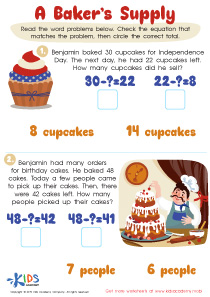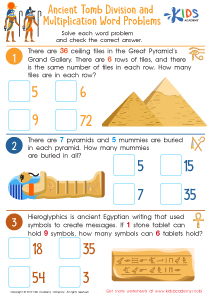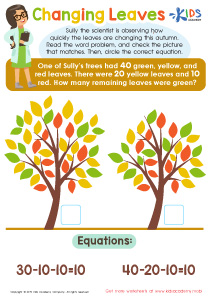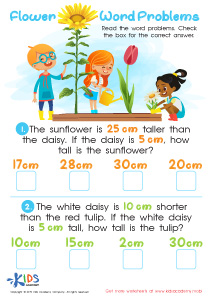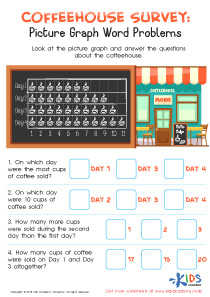Easy Time Word Problems Worksheets for 8-Year-Olds
1 filtered results
-
From - To
Introducing our Easy Time Word Problems worksheets, expertly crafted for eight-year-old learners! These engaging and educational printables are designed to strengthen your child's time-telling skills through fun and interactive word problems. Each worksheet is tailored to help students grasp the concept of time, from reading clocks to calculating intervals. Perfect for bolstering mathematical understanding in a real-world context, our worksheets will ensure your child masters the essentials of time management and problem-solving. Dive into our collection today and watch your child develop confidence and proficiency in managing time efficiently!
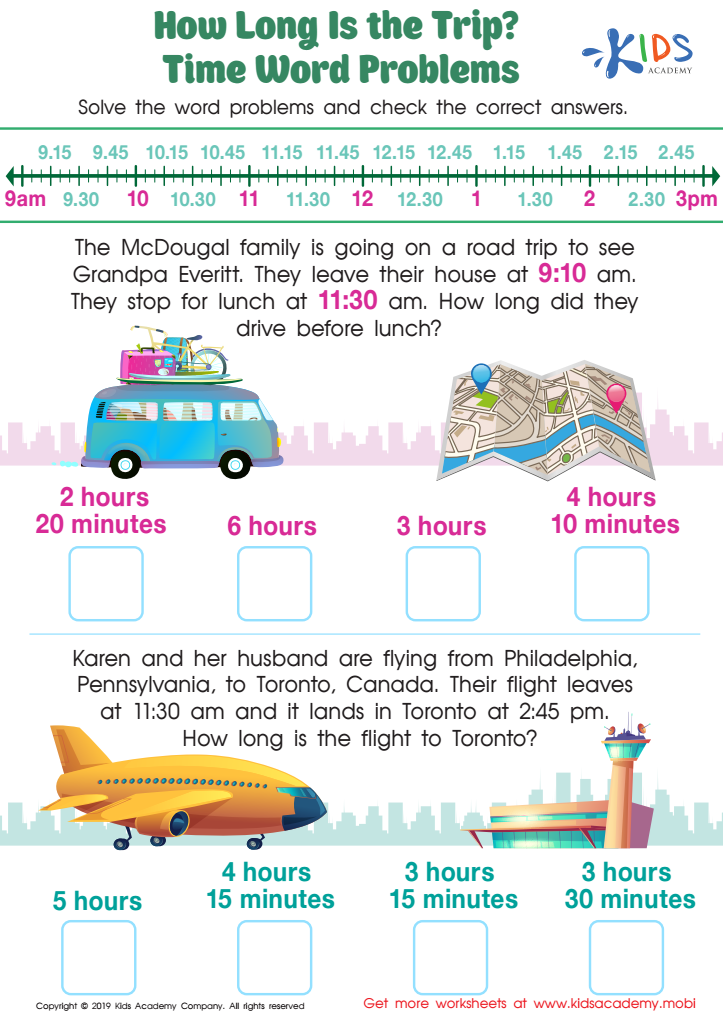

How long is the Trip? Time Word Problems Worksheet
Easy worksheets on Time Word Problems are a fundamental educational tool, especially for children around the age of eight. These educational online worksheets are specifically designed to enhance a child's understanding of time, an essential concept in both academic and everyday settings. The utility of these worksheets lies in their ability to blend learning with interactive and engaging content, which is crucial in capturing the attention of young learners.
Why Are Time Word Problems Important?
Time is a continuous sequence that affects all aspects of life. From knowing when to wake up for school to understanding how long a homework task should take, time management is a skill that children need to learn early on. Time word problems help children grasp these concepts in a practical and relevant way. By presenting scenarios that they might encounter in real life, such as calculating the duration of different activities or understanding the time left until a certain event, children can relate the problems to their daily experiences.
Educational Benefits of Easy Time Word Problems Worksheets
-
Enhances Problem-Solving Skills: Educational online worksheets that focus on time word problems encourage children to apply their mathematical skills in addition to reasoning and logical thinking. They must analyze the problem, figure out what is being asked, and decide the best method to find the answer. This process is crucial in developing a child's problem-solving abilities.
-
Improves Mathematical Skills: While dealing with time word problems, children practice addition, subtraction, and sometimes multiplication and division. This repetition solidifies their arithmetic skills, which are foundational for more advanced math concepts they will encounter later in their educational journey.
-
Teaches Time Management: As children solve time-related questions, they inevitably learn about the concept of time management. They begin to understand how long certain activities last and how to plan accordingly. This is an invaluable life skill that extends beyond academics.
-
Boosts Confidence: Mastery of any skill boosts confidence. As children work through these worksheets and start solving the problems more efficiently, their confidence in handling mathematical questions and daily time-related decisions increases.
-
Interactive Learning: Many educational online worksheets are interactive, providing instant feedback and hints. This interaction keeps the learning process dynamic and allows children to learn from their mistakes immediately, adapting their strategies in real time.
-
Accessibility and Convenience: Being online, these worksheets are easily accessible from any device with internet access. This convenience allows children to practice anywhere, be it at home or while traveling, making it easier to fit learning into a busy schedule. The digital format also means that these resources can be updated and adjusted to meet the evolving educational standards and the specific needs of different learners.
-
Customizable Learning Paths: One of the greatest advantages of educational online worksheets is the ability to tailor the learning content to suit the individual pace and level of each child. For eight-year-olds, who are at a critical developmental stage, this customization can help cater to varying degrees of aptitude and interest in mathematics.
-
Engagement Through Graphics and Interactive Elements: Educational online worksheets often come with colorful graphics and interactive elements that make learning more appealing to young children. These features help sustain their attention and interest, making learning feel like a game rather than a chore.
-
Encourages Independent Learning: With intuitive interfaces, these online platforms encourage children to take charge of their learning. They can navigate through problems, use available tools to assist with calculations, and control their progression through different levels. This autonomy builds independent learning habits that are beneficial throughout their academic career and beyond.
-
Facilitates Parental Involvement: For parents, these educational online worksheets provide a wonderful opportunity to get involved in their child’s learning process. They can track progress, identify areas where their child might be struggling, and find additional resources to help reinforce learning. This involvement can strengthen the parent-child relationship and boost the child’s motivation and morale.
Conclusion
For eight-year-olds, mastering the concept of time not only facilitates academic success but also helps in daily scheduling and long-term planning. Educational online worksheets specializing in easy time word problems are an excellent tool in this regard. They provide a structured, interactive, and enjoyable means of learning that addresses the developmental needs of children at this age. By integrating these resources into a child's learning routine, parents and educators can help develop not only math skills but also critical thinking, time management, and independent learning skills that will serve them well throughout their lives.
 Assign to the classroom
Assign to the classroom

.jpg)




